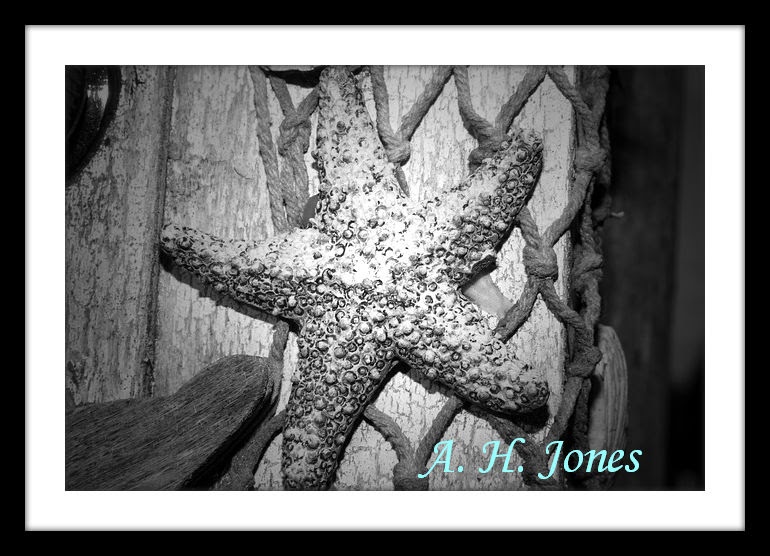52 Ancestors: #8 --Alexander Hamilton Jones
This week's post is regarding my maternal 2nd great grandfather, Alexander Hamilton Jones.
He was one of the 6 children of Cesar Jones and Mary H Mitchel Jones. Born in Swansboro, Onslow County, NC on or about March 5, 1852, he moved with the other members of the Jones family to Morehead City, NC by 1880. Although, I haven't been able to locate the family group on the 1870 Federal Census, I suspect that the Jones clan was living in or around the Riverdale, North Carolina area during this time. This suspicion is based on the fact that he went on to marry my 2nd great grandmother Rosa Mitchell of that town on June 4, 1880.
"North Carolina, County Marriages, 1762-1979 ," index and images, FamilySearch (https://familysearch.org/pal:/MM9.1.1/VXT3-DH4 : accessed 19 Mar 2014), Alexander H Jone and Rosetta Mitchell, 04 Jun 1880; citing Craven, North Carolina, United States; FHL microfilm 000288302.
Mitchell, Rosetta Race: C Age: 19 Married by H. R. Pelham, at the Mitchell's Residence. Title: --Bapt. Date: June 4, 1880. Witness: Addie Williams.
Jone, Alexander H. Race: C Age: 27 Witnesses: William Allen, David Sampson.
**Here's an interesting side note regarding the witnesses. William Allen was a brother to a Chloe Allen Mitchell. Chloe Allen Mitchell was married to Rosa's older brother, Alfred Mitchell. David Sampson would go on to marry Rosa's younger sister Mary Mitchell in 1885.
Alexander and Rosa Jones were parents to 6 children but only 4 lived long enough to be found in any records.
Lovey Ann Jones Harris Watson (January 14, 1883--June 2, 1948)
Cesar M Jones (December 6, 1885--June 3, 1898)
Mary E Jones Wooten Price (January 1888--1942)
Ophelia T Jones Bryant (November 20, 1894--February 20, 1939)
--my great grandmother
By 1900, my 2nd great grandparents were property owners in Morehead City. Evidence of this can be found on the 1900 Federal Census. It appears that Alexander was able to earn a decent income from his occupation as fisherman.
Source Information: Ancestry.com. 1900 United States Federal Census [database on-line].
Provo, UT, USA: Ancestry.com Operations Inc, 2004.
**Note that Alexander is shown living next door to his older brother Oliver Jones. Both own their homes free and clear.
Alexander Jones was still working as a fisherman in 1910. Sadly he didn't live long enough to make it to the next census. From all their hard work, he and his wife Rosa were able to acquire several properties in Morehead City before his death in 1915. He and his wife's parents had land so it's great to see this tradition of owning property going forth into the next generation.
My 2nd great grandfather died of "Pernicious Anemia" on May 22, 1915.
I found a definition of Pernicious anemia on the National Heart, Lung, and Blood Institute's website, here's the link if you would like to read more about it. http://www.nhlbi.nih.gov/health/health-topics/topics/prnanmia/
Pernicious anemia is a type of anemia. The term "anemia" usually refers to a condition in which the blood has a lower than normal number of red blood cells. In pernicious anemia, the body can't make enough healthy red blood cells because it doesn't have enough vitamin B12.
Without enough vitamin B12, your red blood cells don't divide normally and are too large. They may have trouble getting out of the bone marrow—a sponge-like tissue inside the bones where blood cells are made.
Without enough red blood cells to carry oxygen to your body, you may feel tired and weak. Severe or long-lasting pernicious anemia can damage the heart, brain, and other organs in the body.
Pernicious anemia also can cause other problems, such as nerve damage, neurological problems (such as memory loss), and digestive tract problems. People who have pernicious anemia also may be at higher risk for weakened bone strength and stomach cancer.
Outlook
The term “pernicious” means “deadly.” The condition is called pernicious anemia because it often was fatal in the past, before vitamin B12 treatments were available. Now, pernicious anemia usually is easy to treat with vitamin B12 pills or shots.
With ongoing care and proper treatment, most people who have pernicious anemia can recover, feel well, and live normal lives.
Without treatment, pernicious anemia can lead to serious problems with the heart, nerves, and other parts of the body. Some of these problems may be permanent.
To me it's sad that Alexander had to suffer with this disease which is so easily treatable these days. Makes me want to go take some vitamins right now. You know what I'm saying?!
Original Image courtesy of Find a Grave. Photo taken by Mojo Warren.
Modifications to photo done by me on Fotor.com.
Alexander Hamilton Jones
(March 5, 1852--May 22, 1915)








Comments
Post a Comment